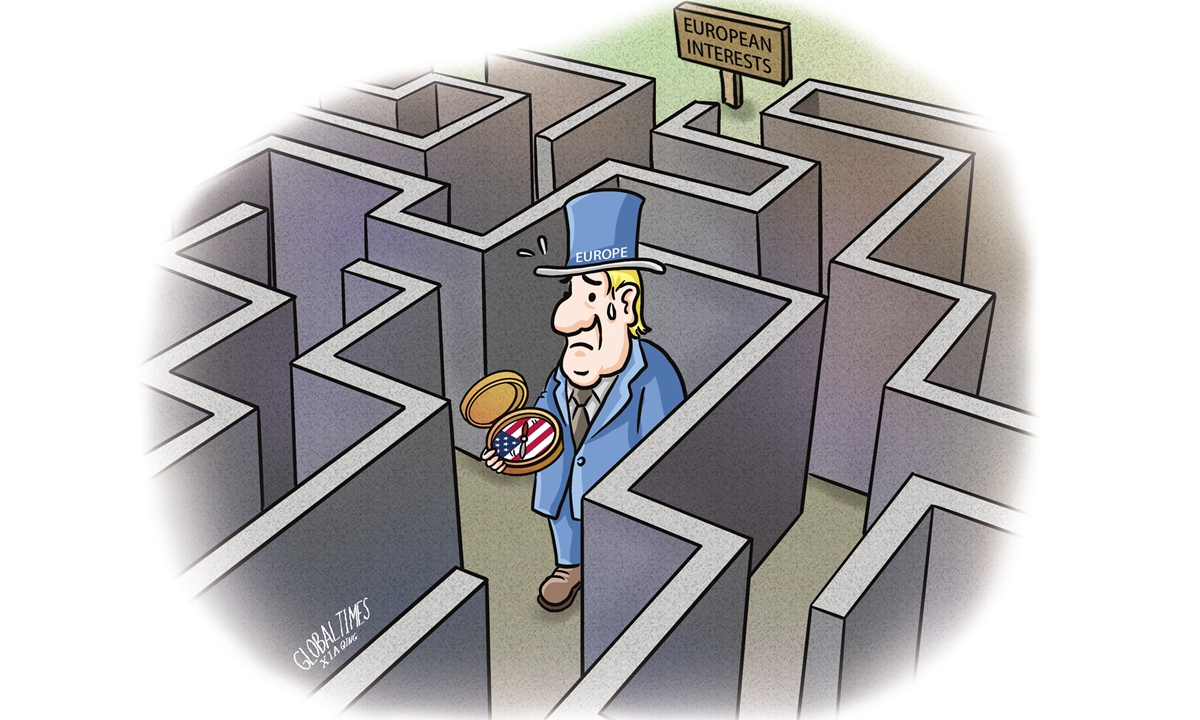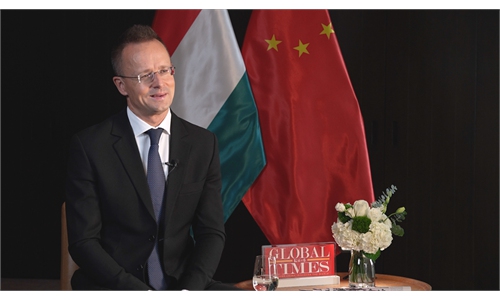
Illustration: Xia Qing/ GT
EU leaders will travel to Washington to attend the 27th US-EU summit this Friday. It is well known that Europe is currently facing difficulties, with a struggling economy, internal divisions, ongoing crises in Ukraine and the Israeli-Palestinian conflict. There is also the possibility of further economic and trade tension with China. It is thus not surprising that Europe is strengthening coordination with the US. However, to what extent can closer ties with US ease its predicament, given its diminishing strategic autonomy and the resurgence of transatlantic tensions?
In the case of Ukraine, Europe is caught in a dilemma. It does not want Ukraine to lose and put Russia at a geopolitical advantage, but it also does not want to excessively provoke Russia and directly involve itself in a war. Currently, the conflict in Ukraine remains deadlocked, but the US has hinted that while it will continue to support Ukraine, this assistance is not going to be indefinite. This implies that the US is likely to withdraw.
Can Europe do the same? In terms of the economy, Europe faces more troubles, especially with its recent increase in criticism toward China. First, the European Parliament passed the "Anti-Coercion Instrument," and then the European Commission announced an anti-subsidy investigation into electric vehicles coming from China. Second, Europe plans to impose tariffs on Chinese steel and aluminum products. It is clear that it is aligning its policy toward China with that of the US, seemingly to balance the competitive pressure brought by China.
In fact, transatlantic relations are not a panacea for Europe's problems, but rather the root of them. Without the continuous eastward expansion of NATO led by the US and the constant squeezing of Russia's strategic space, the situation in Ukraine would not have reached where it is today. By instigating the conflict in Ukraine, the US has achieved multiple goals. Europe has been forced to strengthen its ties with NATO; its efforts for strategic autonomy have been severely undermined; internal divisions have deepened; and it will be forced to compromise with the US on more issues in exchange for security guarantees. At the same time, American energy suppliers have made a fortune by selling liquefied natural gas to their allies at several times the price, and the result of Europe's efforts to strengthen defense is the purchase of more American weapons. In addition, the US has made a fortune from fluctuations in the world food and financial markets, and as a result, Europe is experiencing high inflation, a stagnant economy and the suffering of its people. Europe's coordination with the US on the Ukraine crisis is just like a turkey voting for an early Thanksgiving.
In terms of economic issues, Europe also has misconceptions in its thinking. The Ukraine crisis has plunged Europe into a state of confusion, even to the point of being overly cautious and identifying China's economy as risky. Europe does face competition from China, but this competition itself is not the biggest risk, and protectionism cannot solve the problem but may instead bring more risks by triggering greater conflicts. Europe only sees the dramatic increase in its trade deficit with China last year as a reason to further reduce risks, but it fails to see that its own de-risking strategy has forced companies to adjust their layouts, effectively raising import costs and reducing investment returns.
Unlike the US, Europe has no ambition for global hegemony, nor does it intend to strategically contain China. Europe has always pursued strategic autonomy and neutrality, meaning it is unwilling to get involved in conflicts between major powers. Joining forces with the US to deal with China may seem to reduce risks and expand gains, but in reality, it will largely become a tool for the US to confront China. In the end, Europe's own interests may not be guaranteed. In fact, it is more likely to become a sacrifice to fulfill American hegemony.
Therefore, strengthening coordination with the US does not seem to truly solve Europe's current predicament, and the apparent warmth cannot hide the cracks behind transatlantic relations. Moreover, with the approaching US election, the polarized political struggle will make the US more self-centered, and Europe's needs are unlikely to be considered by the US. So, what price does Europe have to pay for the so-called support from the US? Perhaps what Europe truly should be worried about is whether Donald Trump will return, as past experience has made Europeans fearful and uneasy.
The author is a professor with the School of International Relations at Beijing Foreign Studies University. opinion@globaltimes.com.cn


